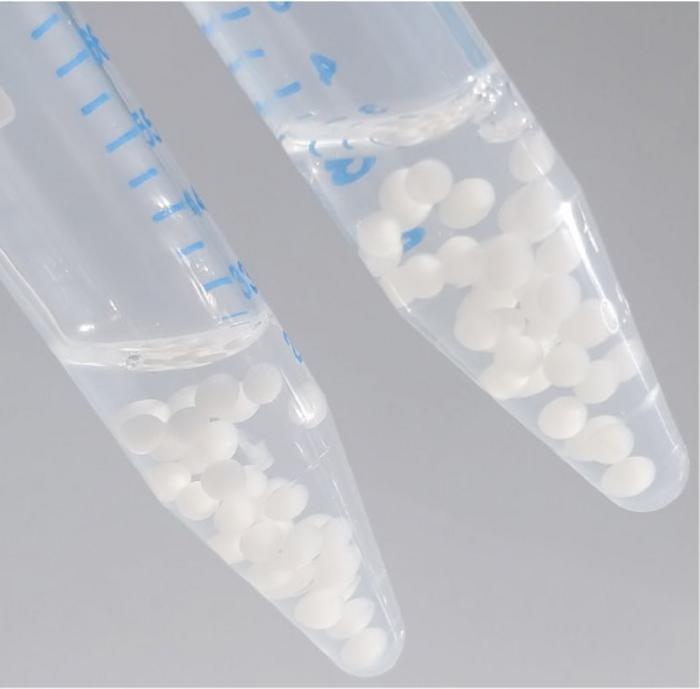Mountains of used plastic bottles get thrown away every day, but microbes could potentially tackle this problem. Now, researchers in ACS Central Science report that they’ve developed a plastic-eating E. coli that can efficiently turn polyethylene terephthalate (PET) waste into adipic acid, which is used to make nylon materials, drugs and fragrances.

Credit: Adapted from ACS Central Science 2023, DOI: 10.1021/acscentsci.3c00414
Mountains of used plastic bottles get thrown away every day, but microbes could potentially tackle this problem. Now, researchers in ACS Central Science report that they’ve developed a plastic-eating E. coli that can efficiently turn polyethylene terephthalate (PET) waste into adipic acid, which is used to make nylon materials, drugs and fragrances.
Previously, a team of researchers including Stephen Wallace engineered a strain of E. coli to transform the main component in old PET bottles, terephthalic acid, into something tastier and more valuable: the vanilla flavor compound vanillin. At the same time, other researchers engineered microbes to metabolize terephthalic acid into a variety of small molecules, including short acids. So, Wallace and a new team from the University of Edinburgh wanted to expand E. coli’s biosynthetic pathways to include the metabolism of terephthalic acid into adipic acid, a feedstock for many everyday products that’s typically generated from fossil fuels using energy-intensive processes.
The team developed a new E. coli strain that produced enzymes that could transform terephthalic acid into compounds such as muconic acid and adipic acid. Then, to transform the muconic acid into adipic acid, they used a second type of E. coli, which produced hydrogen gas, and a palladium catalyst. In experiments, the team found that attaching the engineered microbial cells to alginate hydrogel beads improved their efficiency, and up to 79% of the terephthalic acid was converted into adipic acid. Using real-world samples of terephthalic acid from a discarded bottle and a coating taken from waste packaging labels, the engineered E. coli system efficiently produced adipic acid. In the future, the researchers say they will look for pathways to biosynthesize additional higher-value products.
The authors acknowledge funding from the Carnegie Trust for the Universities of Scotland; the Industrial Biotechnology Innovation Centre; a Future Leaders Fellowship from UK Research and Innovation; and an Engineering and Physical Sciences Research Council Sustainable Manufacturing grant.
The paper’s abstract will be available on Nov. 1 at 8 a.m. Eastern time here: http://pubs.acs.org/doi/abs/10.1021/acscentsci.3c00414
The American Chemical Society (ACS) is a nonprofit organization chartered by the U.S. Congress. ACS’ mission is to advance the broader chemistry enterprise and its practitioners for the benefit of Earth and all its people. The Society is a global leader in promoting excellence in science education and providing access to chemistry-related information and research through its multiple research solutions, peer-reviewed journals, scientific conferences, eBooks and weekly news periodical Chemical & Engineering News. ACS journals are among the most cited, most trusted and most read within the scientific literature; however, ACS itself does not conduct chemical research. As a leader in scientific information solutions, its CAS division partners with global innovators to accelerate breakthroughs by curating, connecting and analyzing the world’s scientific knowledge. ACS’ main offices are in Washington, D.C., and Columbus, Ohio.
To automatically receive news releases from the American Chemical Society, contact [email protected].
Follow us: Twitter | Facebook | LinkedIn | Instagram
Journal
ACS Central Science
DOI
10.1021/acscentsci.3c00414
Article Title
Plastic-eating bacteria turn waste into useful starting materials for other products
Article Publication Date
1-Nov-2023




